-
Posts
8,434 -
Joined
-
Days Won
771
Content Type
Profiles
Forums
Events
Everything posted by ummtaalib
-

All about irregular/abnormal vaginal bleeding (Istihaadah)
ummtaalib replied to ummtaalib's topic in Fiqh of Menstruation
Rulings related to Purity of a Woman in Istihaadhah -

All about irregular/abnormal vaginal bleeding (Istihaadah)
ummtaalib replied to ummtaalib's topic in Fiqh of Menstruation
Am I obliged to wash away the istihada blood on my clothes before praying? muslimacoaching Question: Am I obliged to wash away the istihada blood on my clothes before praying? Answer: Bismi Llahir Rahmanir Rahim Assalamu alaykum wa rahmatuLlahi wa barakatuhu In the Hanafi madhhab, the excused amount of filth that is permitted to remain on a person’s clothes and body such that the prayer remains valid is: less than 5 grams in weight of solid filth, or less than 5 centimeters in diameter of liquid filth. If a person prays with the excused amount of filth on their clothes or body, it is slightly disliked (makruh tanzihi). Thus, it is recommended to remove the filth before praying – although the prayer will still be valid if it is not removed. If a person prays with more than this amount on their clothes or body – and they possess the means to remove it – then the prayer is not valid. This is the general ruling that applies to everyone. The Excused Person Exception There is an exception for someone who has the excused person status. The excused person status is a special status which permits ease in practicing specific rulings related to ritual purity. For more details about the excused person, click here. Thus, this ruling is in relation to the filth that exits from the excuse and it soils the excused person’s clothes. If it is believed that by the time the prayer that the excused person is praying finishes: No new filth would soil the clothing again; then YES, the existing filth must be removed and it is not permissible to pray with it before purifying the garment. More than the excused amount would soil the clothing again; then NO, the filth does not need to be removed and it is permissible to pray in the garment. For example, a woman established the excuse for abnormal vaginal bleeding (istihada). Her blood flow is very heavy and her underwear is soiled with blood. Based on her reasoned judgment, she believes that by the time she finishes making wudu and praying the prayer, more than 5 centimeters in diameter of blood will exit. In this situation, she is not obliged to purify the garment before praying. Otherwise, she must and it is not permissible to offer the prayer in it. Alternatively, she can change her clothing before praying if she has access to another clean garment. -

All about irregular/abnormal vaginal bleeding (Istihaadah)
ummtaalib replied to ummtaalib's topic in Fiqh of Menstruation
Sexual Intimacy During Istihada menstrualmatters Although most women will experience irregular bleeding (istihada) at some point, it’s often confusing and leads to uncertainty in prayer, fasting and sexual intimacy. The paradox of carrying out an act of worship that requires purity, whilst experiencing vaginal bleeding can seem contradictory and even unnatural. Women often doubt whether their worship is valid and or whether it should be redone. Moreover, married women have the added concerns regarding sexual intimacy and what is permitted. Prolonged istihada that is not well-managed can have adverse effects on intimacy in one’s marriage. The confusion that istihada causes is quite normal. The Messenger of Allah (may Allah bless him and give him peace) described istihada as a ‘kick from Satan’ (Nasai: 221) because of the disorientation it causes in matters of religion, especially ritual purity and prayer. However, the confusion is avoidable. By simply learning a few basic principles of istihada and adhering to them, a woman can effectively ease doubts and continue her worship. Rulings Related to Istihada Istihada is irregular vaginal bleeding. It occurs outside of the parameters of what can be legally determined as menstruation (hayd) or post-natal bleeding (nifas). A woman experiencing istihada is not ritually impure. Therefore, she should continue fasting and praying. She is also permitted to touch and recite Qur’an, offer supererogatory (nafl) prayer, enter the masjid and perform tawaf of the Ka’ba. A woman experiencing istihada may fall into the category of an excused person (ma’dhur). This is if her bleeding is continuous, to the extent that she does not have enough time to perform the essential acts of ablution (wudu) and perform her obligatory (fard) prayer. If she determines this is the case, she is a ma’dhur and her wudu will remain for the duration of the entire prayer time, regardless of how much or how often she bleeds. Thereafter, if she bleeds even once during each subsequent prayer time, she will remain a ma’dhur. Whilst she is a ma’dhur, her wudu is only invalidated by the expiration of the prayer time or if she experiences another nullifier. If she determines that she does have enough time to make wudu and pray her obligatory prayer, she will not be classed as excused. Consequently, her wudu will be invalidated whenever she bleeds. Sexual intimacy is permitted during istihada. A woman experiencing istihada should attempt to stem the flow of blood and prevent it from exiting the vagina for the duration of the prayer. She can do this either by inserting something into her vagina, such as a moon cup, tampon, or kursuf that blocks the vaginal passage. If praying in a sitting position stops the blood from flowing, she is required to sit and pray. Sexual Intimacy in Istihada A woman may feel uneasy at the idea of sexual intercourse during istihada. Not only can it feel disconcerting, it also has hygiene implications. Couples may also experience a decrease in the inclination to engage in penetrative sex during istihada. To practically manage this situation, it is recommended that husbands first understand how their wives feel about the issue before initiating intercourse. A woman will better understand her body and the flow of blood; she will be better able to decide. Istihada is irregular bleeding that is usually indicative of a hormonal imbalance or underlying illness and as a result, can cause discomfort and weakness. A temporary break from sexual intercourse may allow her to regain her energy and recuperate. However, this shouldn’t dissuade a couple from other methods of intimacy, such as caressing, kissing, and even non-penetrative sexual intercourse. If istihada is a recurring issue, a couple may decide in the long-term that they will continue with intercourse, despite the bleeding, especially if the flow is light and sporadic. Either way, clear communication between a husband and wife, coupled with consideration for the emotional and physical needs of each other can prevent istihada from becoming a matter of contention and frustration. Rectal Bleeding If a woman experiences rectal bleeding it is recommended (mustahab) to abstain from sexual intercourse. This is because of the slight possibility that rectal bleeding may be confused with menstruation (hayd) due to the proximity of the orifices. Sexual intercourse in hayd is strongly prohibited in Islam and scholars have issued grave warnings for the one who considers it permissible or knowingly engages in it. -

All about irregular/abnormal vaginal bleeding (Istihaadah)
ummtaalib replied to ummtaalib's topic in Fiqh of Menstruation
How do I pray with abnormal vaginal bleeding (istihada)? Muslimacoaching Question: How do I pray with abnormal vaginal bleeding (istihada)? Answer: Bismi Llahir Rahmanir Rahim Assalamu alaykum wa rahmatuLlahi wa barakatuhu A woman who is experiencing abnormal vaginal bleeding (istihada) is still required to pray with ablution (wudu). The blood is ruled as filthy (najas), and its presence on the body or clothes could impact the validity of a woman’s prayers if it exceeds the excused amount. Every woman’s istihada situation will be unique. Some women may see occasional spotting, while others may see a constant flow of blood. Thus, the rulings related to how a woman will pray are dependent upon: if blood continues to exit her vagina while she is making ablution (wudu) or praying the obligatory prayer; and if it is possible for her to stop the blood flow for this duration. Spotting Spotting in this context means that the bleeding is not a constant flow. Rather, the exiting of vaginal blood happens occasionally. A woman could see sporadic bleeding within the prayer time, or the day, or the month. Because the bleeding is light and not constant, a woman who sees spotting should be able to wipe away the blood, wash her front private part, make wudu, and pray the obligatory prayer of the time without any bleeding exiting. If this is the case – that she can successfully complete her wudu and pray the obligatory prayer without blood exiting – then what she has done is sufficient for her prayer to count. There is no need for her to resort to the excused person’s rulings (ma’dhur), make wudu for every prayer time, and the like. Every time she makes wudu, she keeps the status of ritual purity – unless blood exits her vagina or another wudu nullifier occurs. Thus, she is treated as a normal person with the rulings related to ritual purity and prayer. Constant Flow Constant flow is defined as not having the ability to make wudu and pray the obligatory prayer of the current time without vaginal blood exiting. If this is the case, then the rulings will differ for a virgin and non-virgin. Women who have never been married will always resort to the excused person’s rulings, providing that they fulfill the conditions for establishing the excuse. For details of how to establish the excuse and what are the excused person’s rulings, click here. Women who are non-virgins must first try to block the blood flow from exiting the vagina. This is wajib according to many scholars and it is the position of our teachers. There are certain women who may be exempt from this ruling, and their cases are mentioned later in this article. How To Block Blood Flow Any manageable action that can be taken to stop the blood flow for the prayer’s validity must be attempted. Past scholars wrote about women doing ‘hashu’ – stuffing – when they experienced istihada. In today’s times, this can easily be achieved with the use of tampons, moon cups, tissue, and the like. Based on her body and circumstance, a woman should choose what is feasible for her situation. The goal is to stop the blood from exiting in order to maintain ritual purity while she makes wudu and prays. She is only required to block for the duration of her wudu and prayer, and she is not obliged to keep anything inserted in her vagina for the entire day – unless she finds it easier. If she can successfully complete her wudu and obligatory prayer without bleeding exiting the vagina, then this is sufficient for her prayer to count. Every time she makes wudu, she keeps the status of ritual purity – unless blood exits her vagina or another wudu nullifier occurs. If bleeding exits while she makes wudu or prays, her wudu is nullified and the prayer is not valid. Additionally, any colored discharge that leaks down the string of a tampon nullifies wudu if the blood reaches the edge of the vaginal opening or beyond it. How-To: A non-virgin woman with istihada should first wash her front private part and dry herself. Then she inserts a tampon, moon cup, or the like to prevent the flow from exiting. There are different levels of absorbency for tampons, such as light, normal, and super. A woman should choose whatever works best for her situation. Choosing the right size will ensure better protection from leakage. It may be helpful to research tips of how to insert tampons or mooncups, as doing it the wrong way may cause unnecessary discomfort. For example, a tampon should be pushed towards the woman’s back because the vaginal canal is slanted, and it should not be pushed upward towards the sky. It helps to sit on a toilet or to squat when inserting. It is also best to insert a tampon while the vaginal canal is wet with blood and not dry. If despite taking the means to block, a woman’s flow is very heavy such that the bleeding cannot be stopped from exiting during her entire wudu and obligatory prayer, then she will resort to the excused person’s rulings. Exceptions To Blocking The following scenarios are examples of when a woman is not required to block her vaginal blood from exiting. Instead, she must resort to the excused person’s rulings for praying, providing that she meets all the conditions for establishing the excuse. 1) A virgin girl or woman. Some scholars believe that it is sinful for a virgin to insert anything inside of the vagina. This has nothing to do with breaking her virginity. The argument revolves around potentially and purposely inflicting harm upon her by breaking her hymen or causing unnecessary discomfort because she is not sexually active. Consequently, these women will automatically resort to the excused person’s rulings. 2) For a non-virgin, if blocking the blood flow is deemed harmful or causes undue hardship, then she will resort to the excused person’s rulings. Being ‘harmful’ or causing ‘undue hardship’ is determined through clear signs, past experience, or the opinion of an upright, expert Muslim doctor. For example, a pregnant woman who is experiencing vaginal bleeding. This blood is ruled as istihada and she must continue to pray. However, it is not normal to bleed during pregnancy, and a doctor will most likely advise her against inserting anything into her vagina for fear of harming the baby. 3) According to the laws of fasting, inserting an object into the vagina such that it completely disappears into the vagina would break the fast. As such, a non-virgin woman cannot insert a mooncup while she is fasting because the mooncup is inserted entirely into the vaginal canal and no part of it remains outside of the body. Similarly, inserting anything wet or lubricated into the vagina breaks the fast – even if the object does not completely disappear inside the vagina. Thus, a non-virgin woman experiencing istihada should dry her private parts properly and only insert dry materials to block the flow, while taking care to leave part of the object outside of the body. Tampons can be an option if she leaves the string hanging outside of the vaginal hole. If this is not possible, then she would use the excused person’s rulings during the fasting day and block from Maghrib to Fajr. Please note that it is vital for women to record the days and times that they see istihada, as it may impact several rulings related to their habit and worship. Check out our courses for more details about the general rulings of worship and menstruation. Jazak Allah khayran Naielah Ackbarali References: Imam ibn Abidin, Radd al-Muhtar Imam ibn Abidin, Manhal al-Waridin Imam Shurunbulali, Maraqi al-Falah Imam Tahtawi, Hashiyya al-Tahtawi © Muslima Coaching, All Rights Reserved. -

All about irregular/abnormal vaginal bleeding (Istihaadah)
ummtaalib replied to ummtaalib's topic in Fiqh of Menstruation
Istihada: What is it? Bismi Llahir Rahmanir Rahim by Naielah Ackbarali Abnormal vaginal bleeding (istihada) is invalid blood. Practically speaking, it is any colored vaginal discharge that is not ruled as menstruation (hayd) or lochia (nifas). Contrary to popular thought, istihada is not a specific color, consistency, or flow. In the Hanafi madhhab, istihada can be any color and any type of flow – even red, heavy bleeding. The days that a woman experiences istihada are also known as legal purity (ṭuhr hukmi). This means that even though she is seeing blood, she must act like a woman in a state of purity. PURITY RULINGS RELATED TO ISTIHADA The prohibitions that apply to a woman in a state of menstruation and lochia do not apply to a woman who is experiencing istihada. Thus, a woman with istihada is still required to carry out her obligatory worship despite her vaginal bleeding. This means that: She must pray her daily obligatory (fard) and witr prayers with ablution (wudu). The blood from istihada is deemed filthy (najas), and its presence on a woman’s clothing could impact the validity of her prayer. For more information on how to pray with istihada, read this article. She must fast if it is Ramadan. She is permitted to recite the Qur’an, touch the Qur’an directly with ablution (wudu), enter a mosque, and perform tawaf with wudu. She is permitted to engage in marital relations – no matter how heavy the flow. EXAMPLES OF ISTIHADA Continue reading at muslimacoaching -

Hanafi Fiqh Q / A...browse & Learn Or Ask A Question
ummtaalib replied to ummtaalib's topic in Hanafi Fiqh (General)
Darul Iftaa and website launch *Darul Iftaa New York* https://askthemufti.us/ _A continuation of the legacy of Mufti Ebrahim Desai RA_ *About Darul Iftaa New York* Darul Iftaa New York is a registered 501(c)(3) non-profit organization that aims to provide Islamic solutions to issues faced by the Muslim community in living according to the deen as understood by the Ahl al-Sunnah wa l-Jama‘ah. Darul Iftaa New York is a registered 501(c)(3) non-profit organization that aims to provide Islamic solutions to issues faced by the Muslim community in living according to the deen as understood by the Ahl al-Sunnah wa l-Jama‘ah. Darul Iftaa NY is an affiliate of Darul Iftaa Mahmudiyyah in Sherwood, Durban, which was run by Mufti Ebrahim Desai (may Allaah have mercy on him). Mufti Ebrahim Desai (may Allaah have mercy on him) had advised us several times to open a branch of Darul Iftaa Mahmudiyyah in New York for both issuing fatawa and providing iftaa training, but we did not feel ready to do so at the time. Before establishing this Darul Iftaa, we were informally answering questions through a series of “Ask Mufti” WhatsApp groups that were started just before Ramadan two years ago at the suggestion of Mufti Tahmid Chowdhury (may Allah reward him). Mufti Ebrahim (may Allaah have mercy on him) was very happy to hear of this service and gave us his du‘aas to proceed. Alhamdulillaah, we have been able to answer over ten thousand questions so far. After the passing of Mufti Ebrahim Desai (may Allaah have mercy on him), his family informed us that he had repeated his request that we open a Darul Iftaa in his wasiyyah. In accordance with Mufti Ebrahim’s final wishes, and after receiving the du‘as of many of our teachers, we established Darul Iftaa NY in 2022 by the grace of Allaah Ta‘aala. *Our Team* Mufti Muajul I. Chowdhury Mufti Lutfi I. Alam Mufti Tahmid A. Chowdhury Mufti Mehrazur Rahman Mufti Tareque Ahmed *Services of Darul Iftaa New York* – Islamic Q&A and Issuing of Fatawa – Islamic commerce and finance advisory – Shari’ah compliance and advisory for businesses – Islamic Counseling – Islamic Estate planning: wills, inheritance and trusts – Zakaah calculation and assistance – Educational workshops and courses – Islamic Research – Publication of Islamic literature – Welfare and social work – Mediation and Arbitration *Follow us on:* Facebook: https://www.facebook.com/Darul.Iftaa.NY/ Twitter: https://twitter.com/Darul_Iftaa_NY Instagram: https://instagram.com/darul_iftaa_ny -
Du’a for a New Year At the approach of a New Year or month, the Sahabah (radiyallahu ‘anhum) would recite the following du’a. Sayyiduna ‘Abdullah ibn Hisham (radiyallahu ‘anhu) reports that the Sahabah (radiyallahu ‘anhum) would learn the following du’a for when the new month or New Year would begin: اللّٰهُمَّ أَدْخِلْهُ عَلَيْنا بِالأَمْنِ وَالإِيمان وَالسَّلامَةِ وَالإسْلام وَرِضْوَانٍ مِّنَ الرَّحْمٰن وِجوارٍ مِّنَ الشَّيْطان Allahumma adkhilhu ‘alayna bil amni wal iman, was salamati wal islam, wa ridwanim minar Rahman, wa jiwarim minash Shaytan Translation: O Allah, bring this [month or year] upon us with security, iman, safety, Islam, your pleasure and protection from Shaytan. (Al-Mu’jamul Awsat of Tabarani, Hadith: 6237) ‘Allamah Haythami (rahimahullah) has ruled the chain as sound (hasan). (Majma’uz Zawaid, vol. 10 pg. 139-140) Hafiz Ibn Hajar (rahimahullah) has graded the chain that was quoted by ‘Allamah Baghawi for this narration as authentic (sahih). (Al-Isabah, no. 5007) Lets learn this du’a and teach it to others. The Ummah is in dire need for every part of this du’a. al-miftah
-
Muharram: The Month of Allah During certain blessed moments and places, we are given a wealth of opportunities to seek the mercy, love and blessings of Allah. These moments, particularly the ‘sacred months’, have been specially selected by Allah as the best times to worship Him and attain His proximity. From among these sacred months, we recently witnessed the month of Dhul Ḥijjah. We are yet again fortunate to witness another blessed month; a chance for us to begin the New Islamic Year with good deeds, righteous intentions and praiseworthy resolutions. The Four Sacred Months Regarding the sacred months, Allah said in the Noble Qur’ān: “Indeed, the [ordained] number of the months according to Allah is twelve [lunar] months, [as was decreed] in the [Preserved Heavenly] Book of Allah on the day He created the heavens and the earth. Four of them are sacred. That is the upright religion so do not wrong yourselves in them.” (9:36) These four months are Dhul Qaʿdah, Dhul Ḥijjah, Muḥarram and Rajab. The Messenger of Allah ﷺ said: “The year is twelve months of which four are sacred: the three consecutive months of Dhul Qaʿdah, Dhul Ḥijjah, Muḥarram, and Rajab of Muḍar (named after the tribe of Muḍar as they used to respect this month) which occurs between Jumād (al-Ākhirah) and Shaʿbān.” (Bukhārī 4406, Muslim 1679) The specific mention of these four months does not mean that other months are not sacred, because the month of Ramaḍān is unanimously the most sacred month in the year. But these four months were specifically termed as sacred months because even the Pagans of Makkah observed their sacredness, following in the footsteps of their forefather Ibrāhīm (ʿalayhis-salām). Despite their frequent tribal battles and regular wrangling, they deemed it unlawful to fight in these months. The sacredness of these four months was established right from the day Allah created the universe. The Magnitude of Actions during the Sacred Months Ibn ʿAbbās (radiy Allāhū ʿanhumā) said, “The phrase ‘so do not wrong yourselves in them’ refers to all the months, then these four were singled out and made sacred – thus sins in these months are more serious, and good deeds bring a greater reward.” In regards to the phrase “so do not wrong yourselves in them,” Qatādah (raḥimahullāh) said, “Wrongdoing during the sacred months is more serious and incurs a greater burden of sin than in other months. Wrongdoing is a serious matter in any circumstances, but Allah makes whatever He wills of His commands carry more weight.” He further said, “Allah has selected the elite from His creation: from the angels He selected Messengers; from mankind He selected Messengers; from speech He selected dhikr (His remembrance); from the spaces on earth He selected the Masājid; from the months He selected Ramaḍān and the sacred months…So, venerate that which has been venerated by Allah, for the people of understanding and wisdom venerate that which Allah had venerated.” (Ibn Kathīr) Start the Year on a Good Note Whether it is the beginning and end of the day or the beginning and end of the year, these beginnings and ends constantly remind us of our own beginning and end. It gives us a chance to reflect and ponder on our inevitable death, make amends and firm resolutions. Ibn Rajab (raḥimahullāh) said, “(Two of the) sacred months mark an end and the beginning of the Islamic Year: therefore, whoever fasts in Dhul Ḥijjah (excluding the prohibited days) and in Muḥarram has ended and started the year in worship. It is thus hoped that the entire year will be recorded as worship, as whoever starts any action with worship and ends it in worship, will be considered to have been in a state of worship between both of these times.” Why is Muharram Special? Along with being from among the sacred months, Muḥarram has other characteristics which are exclusive to it. They include: 1. The only month known as the ‘Month of Allah’ The Messenger of Allah ﷺ described Muḥarram as the “Month of Allah”. (Muslim 1163) The virtue and honour of this month can be attested to by the fact that it is the only month attributed to the name of Allah. A virtue which is exclusive to it. Ibn Rajab said, “Such an attribution is only made by Allah to the elite of His creation, such as the attribution of the Prophets to Himself as His slaves, and the attribution of the House (Kaʿbah) and the Camel to Himself.” 2. The best month to fast after Ramaḍān The Messenger of Allah ﷺ said, “The best fasting after Ramaḍān is the sacred month of Allah (Muḥarram).” (Muslim 1163) Ibn Rajab (raḥimahullāh) said, “The above ḥadīth makes it clear that the most virtuous optional fasts after Ramaḍān are the fasts of Muḥarram. And given that Allah attributed fasting, amongst all acts of worship, to Himself [saying, “It is Mine, and I Myself will give reward for it.”] it was suitable that this month, which is also ascribed to Allah, be selected for this particular form of worship. 3. It contains within it the Day of ʿĀshūrā’ The Messenger of Allah ﷺ said: “Fasting the day of ʿĀshūrā’, I hope Allah will expiate thereby for the year that came before it.” (Muslim 1162) For the virtues of ʿĀshūrā’, click here. What to Do in Muharram Below are a few things which you can do to make the most of this blessed month: Make duʿā’, especially while fasting. The Messenger of Allah ﷺ said, “There are three prayers that are not rejected: the prayer of a father for his child, the prayer of the fasting person and the prayer of the traveller.” (Tirmidhī 1905) To learn how to make du‘ā’ along with the du‘ās from the Qur’ān and Sunnah, download our free publication ‘I Am Near’. Recite and reflect over the Qur’ān. Make realistic targets which best suit your commitments, but aim to recite the Qur’ān daily. This may be a full chapter or even a few pages. Along with recitation, take time out to reflect and ponder over the message of the Qur’ān. Do dhikr abundantly. Make an intention to learn the Sunnah adhkār, especially the morning and evening adhkār, the adhkār after ṣalāh and of sleeping and the adhkār for general actions. Download a free copy of ‘Daily Adhkār’. Give in charity. The Messenger of Allah ﷺ said, “Spend in charity and do not count it, lest Allah counts it against you. Do not hoard it, lest Allah withholds from you.” (Muslim 1029) May Allah make this year our best year and the days of this year our best days; both individually and collectively as an Ummah. Āmīn. lifewithallah
-
Israel's new "Facebook Bill" A new Israeli bill, dubbed the “Facebook Bill,” would give the Israeli government unprecedented powers to remove not only social media posts, but content from any website, including news platforms.HOW DOES THIS IMPACT PALESTINIANS?Israel already censors social media posts from Palestinians and allies who shed light on Israeli violence against Palestinians.Israel’s new bill threatens to escalate this censorship, giving the Israeli government even more authority to silence Palestinians. Full article here
-
Q. Is the Wudhu and Salaah of a woman with eyelash extensions valid? Does it make a difference if the eyelash extension is attached to the eyelash and not its roots? (Question published as received) A. Generally, eye lash extensions are attached to the eyelashes or eyelids with a non-permeable solution like glue etc. In that regard, regardless of whether the eyelash extension is attached to the roots of the eyelash or not, the performance of Wudhu and Ghusl will not be valid as it is a requirement for water to reach the complete eyelash including its roots. (Hindiyyah 1/4) N.B. Eyelash extensions made from human hair or pig hair are prohibited under all circumstances. (Hindiyyah 5/358 – Ahsanul Fataawa 8/75) And Allah Ta’ala Knows Best Mufti Ismaeel Bassa Mufti Moosa Salie (The answer hereby given is specifically based on the question asked and should be read together with the question asked. Islamic rulings on this Q&A newsletter are answered in accordance to the Hanafi Fiqh unless otherwise stated.) Fatwa Department Jamiatul Ulama (KZN) Council of Muslim Theologians
-
Assalamu Alaykum Wa Rahmatullah. Please can you clarify this for me? Do the scholars of Deoband and their followers believe that Allah Ta’aala is (Astaghfirullah), I don’t even want to say it but for the purpose of gaining knowledge, do they believe that Allah Ta’aala is capable of lying? This, to me doesn’t make sense when lying is haram and considered a very ugly thing in Islam. Answer: In the name of Allah, the most Beneficent, the most Merciful. When discussing complexities which are related to Allah most high, one has to be very cautious, lest (Allah forbid) he utters something which is blasphemous and against the honour and dignity of Allah most high. Allah Ta’aala is free from all faults, he cannot be questioned for anything he does or doesn’t do. Allah Ta’aala says: “He cannot be questioned concerning what he does and they shall be questioned” (21:23) Falling into the topic which you have mentioned in your question, is extremely dangerous for the Iman of a believer. It can cause confusion, misunderstanding, misinterpretation, false judgements and disputes amongst one another. Therefore it is better and advised that we refrain from discussing such topics. This is neither something we are obliged to learn, nor will we be asked about it on the day of judgement. Having said that, what is the response of the ulama of deoband with regards to this query? People have approached the ulama of deoband with this question before. The ulama of deoband have explained this issue to the best of their knowledge according to the Quran and Sunnah. Therefore we need to look at this from an academic perspective rather than an emotional one. One of my respected teachers Hadhrat Molana Abdurrahim Ibn Dawud (May Allah preserve him) was asked this question and this was his reply: “Don’t fall into such arguments! You know Ulema-e-Deoband fully well. So keep your connection with the ulema, learn from them and derive maximum benefit from them. They are the ulema of haq and they are the ones who have been upholding the truth in times of fitnas. The reality is that some ulema of Deoband were asked, “Can Allah lie?” They explained that Allah never lies. Allah Himself has said in the Quran: “Who is more truthful in words than Allah?” (Surah Nisaa 04:87 and 122) Allah doesn’t need to lie. He is not scared of anyone nor does he need to please anyone so that he would tell a lie. He has instructed us to speak the truth at all times, so why would he do the opposite? Thereafter they explained that Allah has the power to do whatever he wants. So if he wanted to lie, nobody can stop him. No one can take that power away from him. There is a difference between “Allah does lie” and “Allah can lie.” So people who don’t like Ulemae-Deoband mix both things and say that they believe that Allah does lie. Be careful of the deceit of such misleading people.” (Tafseer-raheemi.com Q630) Only Allah Knows Best Written by Mufti Abdullah al-Ma’mun Checked and approved by Mufti Mohammed Tosir Miah Darul Ifta Birmingham.
-
Articles taken from https://lifewithallah.com/articles/sweetness-of-salah/
-
20: The Secret Of Salah: Focus Your Heart On Him We now arrive at the final and potentially the most important way to achieve khushūʿ in your ṣalāh. Ibn al-Qayyim (raḥimahullāh) has described it as ‘the secret and essence of ṣalāh.’ The secret of ṣalāh, and what transforms it from being a lifeless body to a real, moving and powerful force is: turning to Allah (ʿazza wa jall) fully and completely with your heart. During ṣalāh it is not permissible to turn your face away from the qiblah. Similarly, as His sincere slave, it is not befitting to turn your heart away from your Lord to matters other than Him. When placing your heart before Allah (ʿazza wa jall), do it with utmost humility, as though you are seeing Him. When asked by Jibrīl (ʿalayhis-salām) to define ihṣān, the Prophet ﷺ said, “That you worship Allah as though you are seeing Him; for if you cannot see Him, He truly sees you” (Muslim). The attainment of iḥsān should be every believer’s life goal. Iḥsān is to strive to worship Allah with the presence of the heart and watchful awareness (murāqabah). The reward of this will be the best of rewards: seeing Allah (ʿazza wa jall) Himself in Jannah inshā’Allah. Ṣalāh is akin to a heavily guarded treasure chest that can be opened only with a special key. That key is to turn towards Allah (ʿazza wa jall) and turn away from everything other than Him. Go to Allah (ʿazza wa jall) with full presence and concentration. Incline to Him completely. Focus on Him Alone. If you turn to Him, He will turn to you. If you turn away from Him, He will turn away from you. Achieve this by removing the world from your heart and purifying your heart from desires and doubts. Think of a cup which is full. To add to it, you must first throw out some of its contents. Likewise, the treasures of ṣalāh cannot enter a heart that is filled with concerns for the dunyā, is steeped in desires, and is riddled with doubts. These must first be removed. Similarly, clear your mind from all evil thoughts and ideas. Instead, steer your mind to think about Allah (ʿazza wa jall): His majesty, His beauty, His kindness, His love and His Generosity. Ḥassān b.ʿAṭiyyah (raḥimahullāh) said, “Indeed two men can be performing the same ṣalāh, but the difference between them is as vast as the distance between the heaven and earth. This is because one of them has fully directed his heart towards Allah (ʿazza wa jall), whereas the other one is heedless and inattentive.” The 3 components of focusing your heart on Allah 1- The focus of the heart: Safeguard your heart from desires, from the worldly thoughts and the whispers of Shayṭān as they will reduce the reward of ṣalāh. 2- The focus of iḥsān: Completely give your heart and its focus to Allah (ʿazza wa jall). Worship Him as though you see Him. 3- The focus of reflection: Contemplate on the Qur’ān and each component of the ṣalāh with its distinctive characteristics. Following this chapter’s exploration of the ten ways of attaining khushūʿ in ṣalāh, the next chapter will take you on a journey through ṣalāh. By understanding and recollecting the significance of each posture, you will find your khushūʿ increasing by the will of Allah (ʿazza wa jall).
-
Q. Kindly advise if it's permissible for a female to get a back and legs massage by a non-Muslim female, and vice versa, for a male to get a massage by a non-Muslim male. This massage is not for any medical reasons. (Question published as received) A. In regards to men, a man is permitted to have a massage done by a Muslim or non-Muslim man of his entire body except the area between his navel to his knees (Awrah/Satr). In regards to women, a Muslim woman is permitted to have a massage done by a Muslim woman of her entire body except the area between her navel to her knees (Awrah/Satr). However, a Muslim woman is not permitted to have a massage done by a non-Muslim woman except for her hands, feet and face. This ruling is subject to the condition that there is no temptation or lust perceived by either one during the massage. In the case of medical needs and necessities, the limitations of the Awrah/Satr will be relaxed to the extent of necessity. (Hindiyyah 5/327) And Allah Ta’ala Knows Best Mufti Ismaeel Bassa Mufti Moosa Salie (The answer hereby given is specifically based on the question asked and should be read together with the question asked. Islamic rulings on this Q&A newsletter are answered in accordance to the Hanafi Fiqh unless otherwise stated.) Fatwa Department Jamiatul Ulama (KZN) Council of Muslim Theologians
-
Israeli settlers launch mass outpost construction operationHundreds of Israeli settlers set out across the occupied West Bank on Wednesday to take part in an unprecedented effort to erect a number of illegal settlement outposts in the territory. Led by Daniella Weiss, a leader of the religious-Zionist and settler movements and an advocate of an “Arab-free” Jewish state, the plans started as a goal of establishing “10 Evyatars” - named after the Evyatar outpost in Beita, what the group considers to be one of its most successful settlement projects in years. Although technically illegal under Israeli law, the new campaign appears to have Far-right Israeli settlers have tacit government support, and is bringing a new wave of violence against Palestinian along with it. Read more here
-
-
19: Bring Your Heart To Salah: Love, Hope & Fear Think of the human being you love the most. Imagine a situation where you have not met for a year. Now is the time for you to finally reunite. How will you feel? What will be running through your mind? How fast will your heart be beating? Similarly, every ṣalāh is an occasion in which you reunite with Allah (ʿazza wa jall) after having been parted. You should feel the same trepidation and excitement at its arrival. As you journey towards Allah (ʿazza wa jall), in and outside of your ṣalāh, there are three primary emotions you should try to cultivate in your heart: hope, fear and love. Hope Hope in Allah (rajā’) is the first of these three emotions. Open your heart and allow it to become overwhelmed with the mercy and kindness of Allah (ʿazza wa jall). Rajā’ springs from thinking good of Him and attaching your heart to Him. In a ḥadīth qudsī, Allah stated, “I am as My slave thinks of Me” (Bukhārī). Remember that Allah (ʿazza wa jall) wants to forgive you. Allah does not want to ‘catch you out.’ Rather He ‘catches’ you when you fall, so long as you turn to Him. Allah (ʿazza wa jall) wants to forgive you, shower you with His mercy and guide you to Paradise. Believe this from the bottom of your heart. Belief in the heart is not enough however. Your belief must be accompanied by action. You must make a distinction between rajā’ and tamannī (wishful thinking). Tamannī is when you fail to take action, yet you still hope for a good outcome. Conversely, rajā’ is when you take the means and place your hope in Him. Such a hope, or rajā’, is achieved by acknowledging everything Allah has blessed you with. Always return to the Source of every blessing in your life: Allah (ʿazza wa jall), the Supreme Provider (al-Razzāq). Another powerful way to fill your heart with hope in Allah (ʿazza wa jall) is by reflecting on His Beautiful Names. The more you know Allah, the more hope you will have in Him. Allah is al-Muṣawwir (The Fashioner); He has created you in the most beautiful form. Allah is al-Raḥmān (The Extremely Merciful); His mercy encompasses all of His creation. Allah (ʿazza wa jall) is The Concealer of sins (al-Sittīr); He (ʿazza wa jall) will not expose you despite the multitude of your sins. Allah (ʿazza wa jall) is Gentle (al-Rafīq); He loves gentleness. Allah is The Most Compassionate (al-Ra’ūf); His compassion knows no ends. Allah (ʿazza wa jall) is The Most Modest (al Ḥayiyy); He feels shy to turn you back, empty-handed. What choice do you have other than to have hope in Him? Fear Fear is the second emotion which should overwhelm you in ṣalāh. Fearing Allah (ʿazza wa jall) should make you tremble in awe of Him and humble you in front of Him. Some say that we should mainly focus on loving Allah (ʿazza wa jall) and having hope in Him. They argue that positivity will bring people closer to the dīn. However, this is misleading and can damage our understanding and application of the dīn. Allah (ʿazza wa jall) says, “…They used to race towards the good deeds and invoke Us with hope and fear; and they were humbly submissive to Us” (21:90). In a ḥadīth qudsī, Allah (ʿazza wa jall) says, “By My Glory, I will not combine two fears nor two assurances for My slave: if he feared Me in the world, I will grant him safety on the Day of Judgement. And if he felt safe from Me in the world, I will make him fear Me on the Day of Judgement.” (Ibn Ḥibbān) In life, you tend to run away from what you fear. For example, anyone who is scared of spiders or rodents will freeze or run away upon seeing them. However, fearing Allah (ʿazza wa jall) is unique and beautiful. It makes you flee to Him, and not away from Him. The more you fear Him, the more you turn to Him. A fear of worldly matters is usually accompanied by a dislike of it. However, the fear of Allah is coupled with love and respect. You are in awe of Him. Although Allah (ʿazza wa jall) is beyond all worldly examples, think of an elderly grandfather or an older person who is well-respected. As soon as he enters the room, everyone falls quiet out of respect for him. The silence is not because this elder is a tyrant of the household; rather, it is because of the respect that his family accords him. This type of fear is known as haybah or khashyah, a reverential type of fear. It is this emotion that the senior Companion ʿAmr b. al-ʿĀṣ (raḍiy Allāhu ʿanhu) felt when he was in the presence of the Messenger of Allah ﷺ . He said even though he ﷺ was the most beloved of people to him, he could not describe him. This is because whenever he was in his company, he was unable to look directly at his blessed face. He would lower his head and humbly gaze downwards, out of deep respect and awe. The fear of Allah (ʿazza wa jall) is not an irrational fear. It is a fear built on knowledge. The more you get to know Him, the more you fear Him. You are in constant awe of His majesty, greatness and power. When the Prophet ﷺ saw Jibrīl (ʿalayhis-salām) in his original form, he had 600 wings, and his huge size filled the horizon between the sky and the earth. Jibrīl is the best of angels, who was tasked with the most prestigious responsibility of transmitting the word of Allah. Despite his physical and spiritual greatness, the Prophet ﷺ saw him on the night of Miʿrāj (ascension) looking like “a worn-out piece of cloth due to the fear of Allah” (Ṭabarānī). Jibrīl’s knowledge of Allah’s majesty and greatness reduced him to this state. Aim to strike a balance between excessive fear and a lack of fear. If there’s too much fear, you’ll end up in despair. And if there’s too little, you’ll become complacent and feel secure from Allah’s punishment. Fear is a deterrent. It prevents you from becoming distracted, disobeying Allah and falling off the right path. Three steps to cultivate fear in your heart 1) Reflect on Allah’s greatness, grandeur and majesty. 2) Reflect on the gravity of standing before Allah (ʿazza wa jall), the terrors of the grave, the horrors of the Day of Judgement, the sharpness of the ṣirāṭ and the torment of the Hell-fire. 3) Think about your sins and shortcomings. Reflect on how little you have prepared for your journey to the hereafter. A life between hope and fear The pious people of the past would advise that during good times, when you are more likely to forget Allah (ʿazza wa jall), you should increase your fear of Him. And during difficult times, you should increase your hope in Him. Other scholars stated that throughout one’s life, fear should be dominant over hope; but towards the end of one’s life, hope should become dominant. When Muʿādh b. Jabal (raḍiy Allāhu ʿanhu) was in his final moments, he turned to Allah (ʿazza wa jall) and said, “O Allah, indeed I used to fear you, but now I have hope in You. O Allah, indeed, you know that I did not love the world nor want to remain in it for long to dig wells or plant trees. Rather it was to experience thirst in the midday heat during the long fasts; to struggle through standing for hours at night in prayer; and to kneel in the company of scholars in the gatherings of dhikr.” Anas (raḍiy Allāhu ʿanhu) reported that the Prophet ﷺ entered upon a young boy who was dying. The Prophet ﷺ asked him, “How are you?” The boy replied, “O Messenger of Allah, I swear by Allah that I have hope in Allah and I am scared over my sins.” The Messenger of Allah ﷺ said, “These two (qualities) do not gather in a slave’s heart in such a moment except that Allah gives him what he hopes for, and protects him from what he is scared of.” (Tirmidhī) Love Love is the third – and most important – emotion. Love is the greatest station the seeker on the path to Allah (ʿazza wa jall) can attain. The love of Allah (ʿazza wa jall) is the purest and greatest of all loves. It gives life to the heart, it is sustenance for the soul, and is the roadway to eternal success. When your heart overflows with His love, you will experience genuine bliss and contentment. Ibn Taymiyyah (raḥimahullāh) said, “Know that there are three things that push the hearts towards Allah: love, fear, and hope. The strongest of these three is love; and it is something that is sought-after in and of itself, since it is something that is desired both in this world and the hereafter, as opposed to fear, which will disappear in the Hereafter. Allah says, ‘For certain, the friends of Allah shall have no fear, nor shall they grieve’ (10:62).” Our purpose in life is to worship (ʿibādah) Allah. ʿIbādah consists of: (1) utmost humility and (2) utmost love. Without love, there is no ʿibādah. Without love, we fail in actualising our purpose of existence. Love is the ‘soul’ of worship. Loving Allah (ʿazza wa jall) is beautiful. It cannot be compared to loving any of His creation, as His creation will cease to be, whilst He is the Ever-Lasting. His creation has limits, whilst He is the Limitless, the All-Encompassing and the Most Able. Loving Allah (ʿazza wa jall) is beautiful because there is no one kinder, more giving and more appreciative than Him. As humans, we are prone to making mistakes, and we are prone to not forgiving those who have erred. On the other hand, Allah (ʿazza wa jall) loves to forgive and will forgive us even if we go to Him with mountains of sins. Our fellow humans tire of our persistent questioning and begging. However, Allah (ʿazza wa jall), our Generous Lord, does not stop giving and is angered when we don’t ask from Him! Loving Allah (ʿazza wa jall) can only be achieved when you prefer Him over everything else. You must love Him more than you love your parents, children, spouse, friends and wealth. Love – by the consensus of the scholars – is an obligation (farḍ) and one of the fundamental aspects of the dīn. When considering matters that are farḍ in our dīn, loving Allah (ʿazza wa jall) does often not cross our minds. Moreover, when we reflect on loving Allah (ʿazza wa jall) , we tend to equate love to obedience. We often limit our perception of Allah (ʿazza wa jall) as someone Very Powerful and Scary. Yes, Allah (ʿazza wa jall) is Extremely Powerful, and this should make us tremble, yet equally, there is nothing more soothing and comforting to the soul than His love. There is a vast difference between someone who obeys Allah (ʿazza wa jall) out of love for Him, and someone who obeys Him without love. When a lover obeys his beloved, the obedience is done willingly and sincerely. Such a level of obedience differs from that brought on by force. The former experiences happiness and joy in willingly complying to the orders, whereas the latter feels burdened, and may even resent the order. Love, therefore, is the driving force and the impetus of ʿibādah. It is this love of Allah (ʿazza wa jall) that makes the slave-Creator relationship special. This love makes the servant eager to be in His company, to converse with Him and do everything possible to please Him. Obedience with love is not just a tick-box exercise that solely involves the fulfilment of obligations. Instead, it consists of a sincere desire to be with Him and remember Him. Love makes the slave eager to meet Him. Love is what makes him cry out in the depths of the night, “My Lord, do not deprive me of the greatest joy: the joy of seeing You in the Final Abode.” The next time you stand up for your ṣalāh, fill your heart with the aforementioned emotions: hope, fear and love. اَللّٰهُمَّ – إِنِّيْ أَسْأَلُكَ حُبَّكَ ، وَحُبَّ مَنْ يُّحِبُّكَ ، وَحُبَّ عَمَلٍ يُّقَرِّبُنِيْ إِلَىٰ حُبِّكَ – (O Allah), I ask You for Your love, the love of those whom You love, and the love of deeds which will bring me closer to Your love (Tirmidhī).
-
By Shaykhul-Hadīth, Hadrat Mawlānā Muhammad Saleem Dhorat dāmat barakātuhum Imām Al-Bukhārī rahimahullāh has narrated a hadīth on the authority of Sayyidunā Abū Hurayrah radhiyallāhu ‘anhu that Rasūlullāh sallallāhu ‘alayhi wasallam said: Many lessons can be derived from this hadīth, but I wish to draw your attention to a specific lesson, that of providing water for the creation of Allāh ta‘ālā. It is evident that the deed that attracted the Mercy of Allāh ta‘ālā was quenching the thirst of a dog. Water – A Gift from Allāh Water is an essential need of a human; a person can survive weeks without food, but only days without water. The body’s function is dependent on water and all its essential organs need a constant supply. As the body cannot make its own water, a person needs to supply the body with water. This important need of humans is provided by Allāh ta‘ālā himself in the form of rain, streams, rivers, lakes, seas and oceans. Allāh ta‘ālā states: Water – A Medium to Gain Great Reward Due to its importance and necessity, Allāh ta‘ālā has also promised great reward for those who provide water to the creation of Allāh ta‘ālā. In the above ḥadīth, we already learnt that it attracts the forgiveness of Allāh ta‘ālā. Many other ahādīth also mention further benefits: • Rasūlullāh sallallāhu ‘alayhi wasallam has stated, “There is no sadaqah more rewarding than [providing] water.” (Al-Bayhaqī) • Upon being asked regarding the most virtuous form of sadaqah, Rasūlullāh sallallāhu ‘alayhi wasallam replied, “[Providing] water.” (Abū Dāwūd) • Rasūlullāh sallallāhu ‘alayhi wasallam stated, “Whichever Muslim quenches the thirst of another Muslim, Allāh will grant him drink from Ar-Rahīqul-Makhtūm.” (Abū Dāwūd) Ar-Rahīqul-Makhtūm is a special wine of Jannah which has been promised for the special servants – the Abrār (the righteous). Allāh ta‘ālā says: Water – A Means of Continuous Reward Sadaqah is of two types: 1. Sadaqah: where the reward is confined to the action and the reward is a single entry. For example, when someone feeds another person, a one-off reward is written for him; and 2. As-Sadaqah Al-Jāriyah: when the reward is continuous. In fact, it also continues after one’s demise. For example, authoring a book from which people benefit; for as long as people benefit from this knowledge, the author will continue to reap its reward. After one’s demise, the avenues to gain further reward by any action inevitably cease. A person finding himself in a bad state in the afterlife cannot carry out any deed to change his situation. Similarly, if he finds himself in a good state and he wishes to enhance his condition further, he is unable to carry out any deed to achieve this. At this juncture, a deceased person has two possibilities of earning reward: 1. Īsāluth-Thawāb: someone performing a good deed and sending him its reward; and 2. As-Sadaqah Al-Jāriyah: as explained above, a deed he carried out during his lifetime which is still generating reward for him. Nabī sallallāhu ‘alayhi wasallam said: There are many forms of As-Sadaqah Al-Jāriyah a person can carry out. In one narration Rasūlullāh sallallāhu ‘alayhi wasallam listed seven and from amongst them he mentioned, “.…a stream which he causes to flow....” (Ibn Mājah) In another narration we find that Rasūlullāh sallallāhu ‘alayhi wasallam also advised providing water as a form of Īsāluth-Thawāb. After the demise of his mother, Sayyidunā Sa‘d Ibn ‘Ubādah radhiyallāhu ‘anhu asked Rasūlullāh sallallāhu ‘alayhi wasallam which sadaqah would be most meritorious and rewarding. Rasūlullāh sallallāhu ‘alayhi wasallam replied, “Providing water.” Sayyidunā Sa‘d radhiyallāhu ‘anhu then got a well dug and dedicated its reward for his mother. (Abū Dāwūd) ‘Allāmah Al-‘Aynī rahimahullāh has mentioned a hadīth wherein Rasūlullāh sallallāhu ‘alayhi wasallam visited a person who was in his last moments. Rasūlullāh sallallāhu ‘alayhi wasallam asked him what he was observing [of the next world]. He explained, “I see two angels distancing themselves from me and two snakes coming closer; and I see evil increasing and goodness weakening.” The person sought help from Rasūlullāh sallallāhu ‘alayhi wasallam by requesting him to make du‘ā. Rasūlullāh sallallāhu ‘alayhi wasallam supplicated, “O Allāh! Accept little [he has done] and forgive the large quantity [of evil deeds he has committed].” Rasūlullāh sallallāhu ‘alayhi wasallam then asked him what he was seeing now. He replied, “The two angels are coming closer and the two snakes are going away; and I see goodness increasing and evil weakening.” Rasūlullāh sallallāhu ‘alayhi wasallam asked him which of his actions he found most rewarding. He said, “Providing water.” (‘Umdah-al-Qārī) Sayyidunā Anas radhiyallāhu ‘anhu narrates that Rasūlullāh sallallāhu ‘alayhi wasallam said: Warning on Not Sharing Water It is the sheer Grace of Allāh ta‘ālā that he has provided this necessity for survival in much abundance and in principle, it is for all people. Therefore, it would be extremely inhuman to deprive someone of water at the time of his need, especially when one has the means to provide it. Consequently, a grave warning has been cited for such wretched people whose hearts do not soften upon seeing others suffering thirst. Rasūlullāh sallallāhu ‘alayhi wasallam has stated: Benefit in this World Providing water not only benefits a person in the hereafter, but it also has worldly benefits. A person once came to ‘Abdullāh ibn Al-Mubārak rahimahullāh complaining about a wound in a knee which was not healing for the past seven years, despite referring to doctors and treating it with various methods of treatment. ‘Abdullāh ibn Al-Mubārak rahimahullāh advised him to find a place where people are in need of water and provide water by digging a well. The person located a place and dug a well and Allāh ta‘ālā cured him. (Al-Bayhaqī) Imām Al-Bayhaqī rahimahullāh narrates that my teacher Imām Al-Hākim had a wound on his face. Despite many types of treatment, it could not be cured for a period of one year. He requested Abū ‘Uthmān Sābūnī rahimahullāh to make du‘ā for him in his weekly majlis on Friday. Abū ‘Uthmān rahimahullāh made du‘ā for him. The people who attended earnestly beseeched Allāh ta‘ālā saying āmīn to the du‘ā of the shaykh. The following Friday, a woman who had attended the previous week, sent a note to Imām Abū ‘Uthmān rahimahullāh. In the note she narrated that, after the previous majlis, she went home and earnestly prayed for Imām Al-Hākim rahimahullāh that night. She mentioned that she saw Rasūlullāh sallallāhu ‘alayhi wasallam in her dream as if he was advising her to tell Imām Al-Hākim rahimahullāh that he should provide water for the Muslims in abundance. When this note reached Imām Al-Hākim rahimahullāh, he ordered a siqāyah [a place where water is provided] to be constructed outside his home. When the construction was completed, it was filled with sweet water. Ice was also placed in it and people began drinking. Not even a week passed and he was cured and his face turned beautiful again. (Al-Bayhaqī) Providing Water to Others It is a great Mercy of Allāh ta‘ālā that we in England do not experience a shortage of water. Clean and abundant water is available at all times. We should be thankful to Allāh ta‘ālā for this great gift. There are so many people throughout the world who have to travel far distances to bring clean water for their homes. The short supply obliges them to get every family member to walk the long distance in order to obtain as much water as possible, including young children. Those of us who are fortunate to have water in abundance and sufficient wealth, should resolve to provide water to the less fortunate ones according to our means. This could be through: • arranging for wells to be dug; • providing water pumps; • providing water coolers; and • setting up drinking fountains. In whatever way possible, we should seek to quench the thirst of people and animals. Providing water to the general public on a hot summer day in this country or elsewhere, will also be a deed that will be greatly recompensed by Allāh ta‘ālā. Along with that, the wider community will be able to appreciate the beautiful teachings of the saviour of humanity, our beloved Nabī sallallāhu ‘alayhi wasallam, who was sent as mercy for the world. May Allāh ta‘ālā grant us the ability to engage in this meritorious act as much as possible, in order to secure His Mercy in this life and in the hereafter. Āmīn. © Riyādul Jannah (Vol. 26 No. 3, March 2017)
-
The Biden administration is facing pressure to scrap plans to build a U.S. Embassy in Jerusalem after a Palestinian legal group revealed the proposed embassy is located on land that was illegally confiscated by Israel from Palestinians in 1948. The historical documents were made public by the Palestinian legal group Adalah ahead of President Biden’s trip this week to Israel and the occupied West Bank. The group’s legal director, Suhad Bishara, said, “This plan is a serious escalation in U.S. legitimization of Israeli expropriation of land from Palestinians. If the Biden administration doesn’t abandon it, then there is no other way to interpret the move than siding with Israel’s racist policies.”

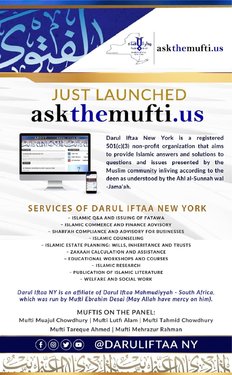
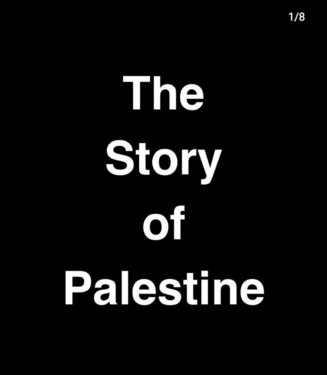

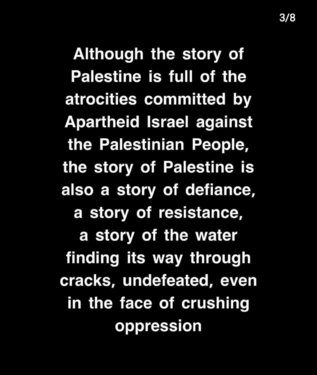
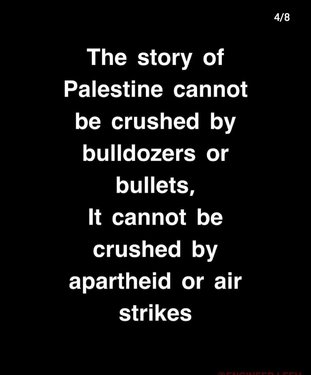
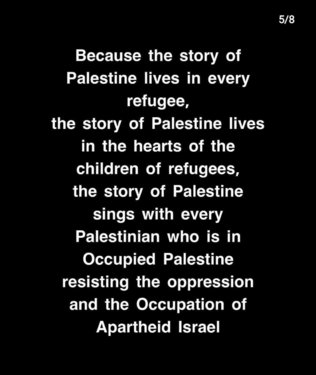
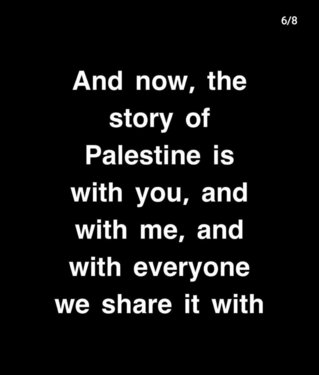
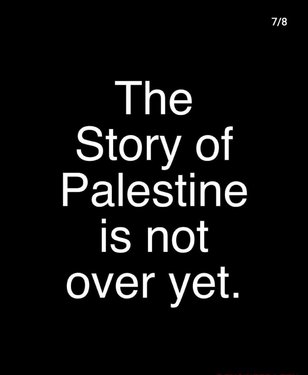

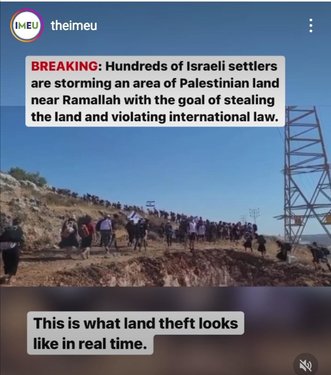
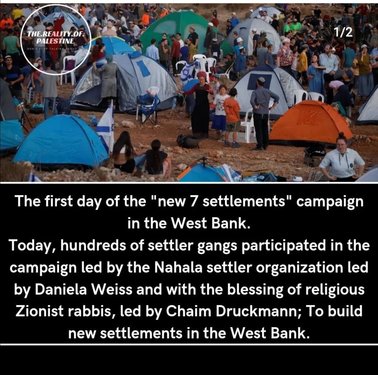
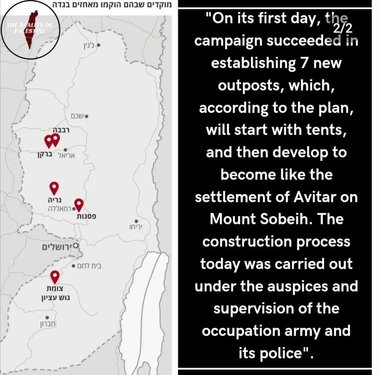


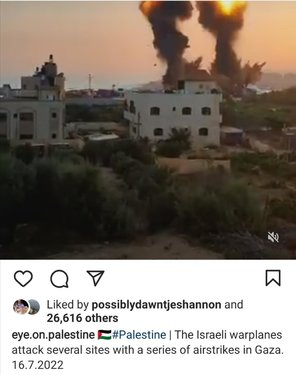

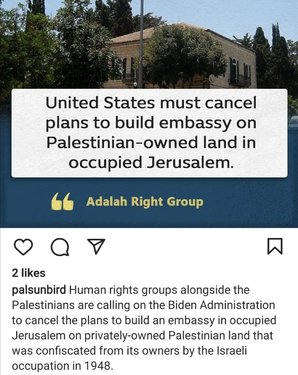
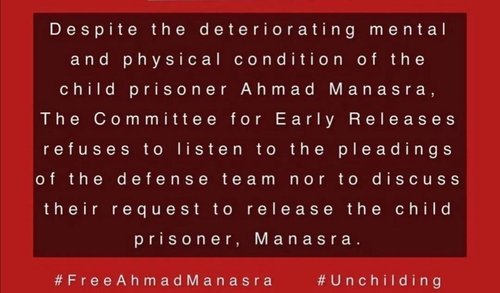
.thumb.jpg.4b93feccaa65ed9c958f23796ba0ec44.jpg)